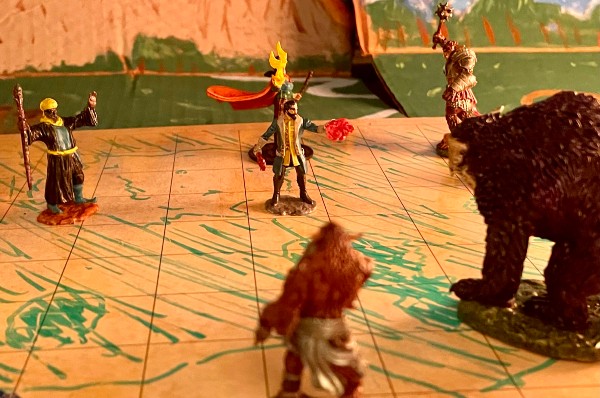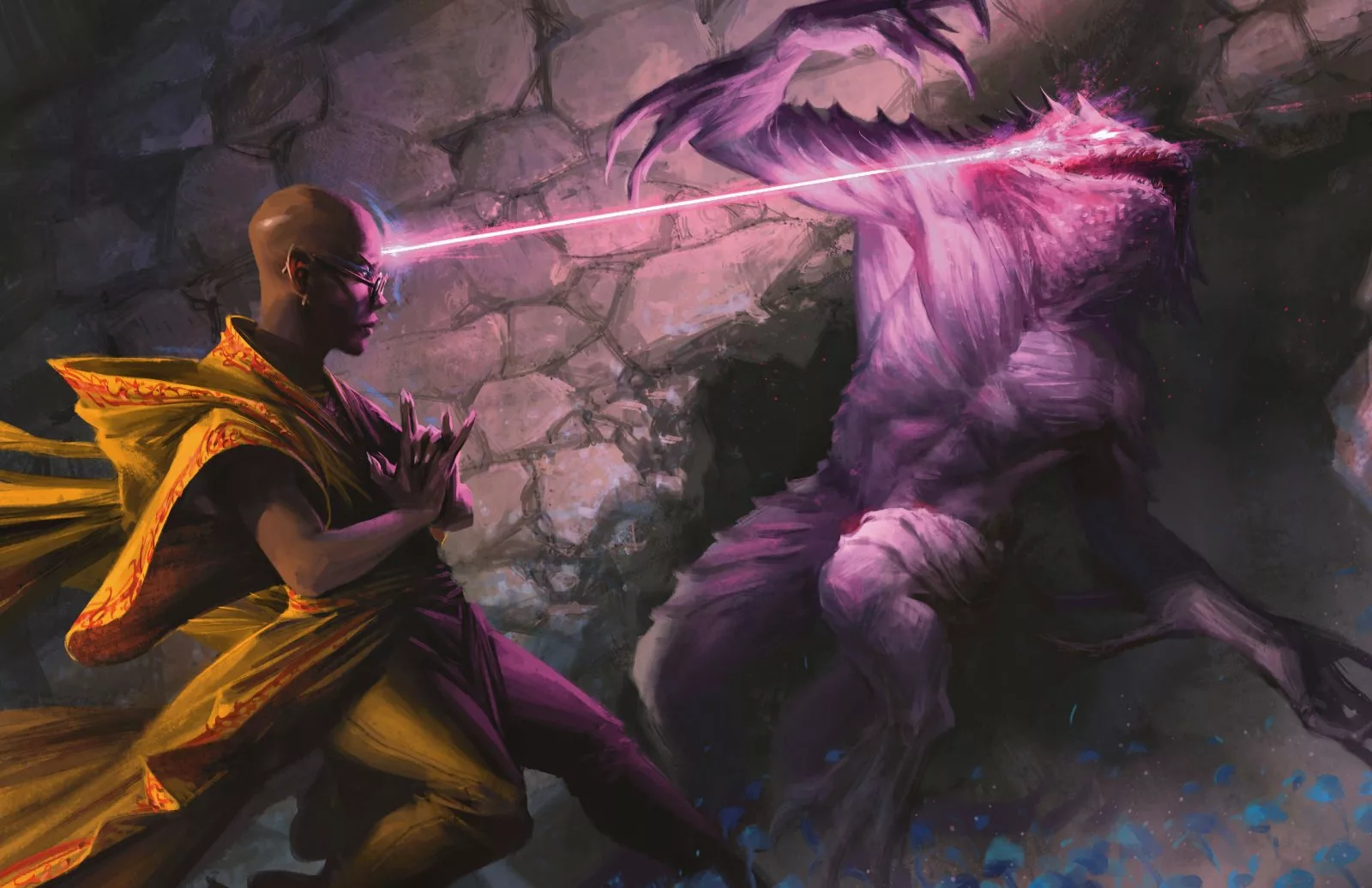You unleash a string of insults laced with subtle enchantments at one creature you can see or hear within range. The target must succeed on a Wisdom saving throw or take 1d6 Psychic damage and have Disadvantage on the next attack roll it makes before the end of its next turn.
Cantrip Upgrade. The damage increases by 1d6 when you reach levels 5 (2d6), 11 (3d6), and 17 (4d6).
Casting Time: 1 action
Range: 60 feet
Components: V
Duration: Instantaneous
School: Enchantment Cantrip
Who can cast Vicious Mockery? Bards have Vicious Mockery on their class spell list. No subclasses get access Vicious Mockery.
Vicious Mockery 5e
Vicious Mockery is a classic, Bard-exclusive cantrip that’s sure to create memorable moments at any Dungeons and Dragons table. A spell that attacks an enemy’s psyche by insulting them is just plain fun.
But Vicious Mockery isn’t just for flavor — it’s an impactful spell that contributes both offensively and defensively in combat situations. This article will cover how the spell works and the best ways to use it.
What Does Vicious Mockery Do in 5e?
Vicious Mockery forces a target to make a Wisdom saving throw. If it fails, it takes 1d6 (3.5 average) psychic damage and has disadvantage on the next attack roll it makes before the end of its next turn. That means it rolls 2d20 and must use the lower result for its attack roll.
As with most damaging cantrips, Vicious Mockery gains an extra damage die at levels 5, 11, and 17.
How Do I Use Vicious Mockery in 5e?
Here are a few ways to use Vicious Mockery in DnD 5e:
-
Protect allies. Vicious Mockery’s damage might be so-so, but it’s excellent as a defensive debuff. Disadvantage on an attack roll is very impactful — even more on an attack against your high-AC frontline. And if your insult target attacks a squishy backliner (like yourself), they’ll be that much less likely to land a hit.
-
Use it as your default option. Cantrips are the fallback action to take when there’s nothing worth wasting a spell slot on. For Warlocks, that’s Eldritch Blast. For Clerics, it’s Toll the Dead or Sacred Flame.
And for Bards, it’s almost always Vicious Mockery. And it’s a great staple spell to spam — relatively low on damage, but big on consistent and reliable support. Wisdom saving throws are also generally pretty bad on enemies, so you’ve got a higher chance of landing this against an enemy than many of the attack roll- or Dexterity save-based cantrips.
-
Get creative (or use an insult generator). Vicious Mockery is just fun to use — make the most of it by leaning into the trash-talking nature of the spell. DMs might even reward you for an especially good line. Even if they don’t, you’ll make the session that much more memorable.
And if you don’t like the roleplaying aspect of the spell, you can always use an insult or Vicious Mockery generator. Or just skip the RP entirely if the whole thing feels tiresome to deal with.
-
Pair with Subtle Spell metamagic. The verbal component of Vicious Mockery isn’t the insult itself. But with Subtle Spell, you can ignore the verbal component and just deliver the insult (and deal damage) without the target knowing you’ve cast a spell.
This doesn’t have much practical application, but it is pretty neat (and dark) to have a character who can literally talk somebody to death by attacking them with insults while they slowly roast in psychic pain, unaware of what’s happening.
This requires either a Sorcerer multiclass dip or picking up the Metamagic Adept feat (TCoE 80).
What Are the Rules for Vicious Mockery in 5e?
The rules for Vicious Mockery in DnD 5e are as follows:
-
Immunity to psychic damage doesn’t grant immunity to Vicious Mockery’s rider effect. This was confirmed by the game’s developers. If a psychic-immune target fails their saving throw against Vicious Mockery, they still have disadvantage on their next attack — they just don’t take any damage from the spell.
Vicious mockery: the second effect isn't reliant on the psychic damage getting through. #DnD https://t.co/c8eXaES0OT
— Jeremy Crawford (@JeremyECrawford) April 27, 2016
-
It only affects one attack roll. So if a creature has Multiattack, it only has disadvantage on the first attack roll it makes, not all of them. This is not limited to weapon attack; spells with attack rolls also have disadvantage.
-
You still need line of sight to target a creature. According to the game’s rules, “To target something with a spell, a caster must have a clear path to it, so it can’t be behind Total Cover” (PHB 238). Vicious Mockery doesn’t get around this by being sound-based; you still need to have a clear path to your target.
-
The words used to cast Vicious Mockery are separate from the words of the insult itself. From the game’s rules, “A Verbal component is the chanting of esoteric words that sound like nonsense to the uninitiated. The words must be uttered in a normal speaking voice. The words themselves aren’t the source of the spell’s power; rather, the particular combination of sounds, with specific pitch and resonance, sets the threads of magic in motion.” (PHB 236).
Additionally, the game’s developers ruled that the Verbal component of the Suggestion spell is separate from the suggestion itself: “Verbal components are mystic words. The spell’s suggestion is a separate, intelligible utterance.”
Verbal components are mystic words (PH, 203). The spell's suggestion is a separate, intelligible utterance. #DnD https://t.co/bADKXnpodN
— Jeremy Crawford (@JeremyECrawford) October 9, 2015
Given that Vicious Mockery makes no mention of breaking this general rule, I can only assume that the developers would rule the same way about Vicious Mockery. This means that you cannot cast Vicious Mockery without the target noticing, unless you’re using the Sorcerer’s Subtle Spell metamagic.
However, players and DMs are split pretty evenly on how they rule/think it should be ruled. This Reddit thread shows that slightly more than half of 540 voters thought that Vicious Mockery should be castable in normal conversation without being noticeable.
In other words, this one’s ultimately up to your DM.
Who Can I Target With Vicious Mockery 5e?
You can target any creature who you can see and isn’t deafened with Vicious Mockery. The target does not need to be able to hear your words in the 2024 version of the spell, a departure from the 2014 version.
Is Vicious Mockery 5e a Good Spell?
Yes, Vicious Mockery is a good spell. Wisdom is one of the lowest average ability scores among creatures in DnD 5e, so it has a greater chance of landing against most targets than a ranged spell attack.
And while Vicious Mockery’s damage is mediocre, its rider effect is quite strong. Disadvantage, even on just one attack roll, is a powerful condition to apply consistently.
Vicious Mockery 5e DM Tips
I touched on the “can Vicious Mockery be cast in normal conversation” debate in the rules section. For my two cents, I think that the spell should totally be castable in this way.
It comes down to this — is it a really significant power creep to give a player a de facto Subtle Spell metamagic for a cantrip they’ll cast in combat 99% of the time anyway? My feeling is that as long as a player isn’t spamming this out-of-combat tactic to get away with murder-hoboing commoners, it’s unlikely to be annoying or overpowered.
My other DM tip for Vicious Mockery is to reward creativity. If a player comes up with a sick burn that’s original and applies to the situation or target of the spell in an incredibly apt way, give them something for it.
The two most common choices are either Inspiration (advantage on a d20 roll of their choice at a later time) or giving the creature disadvantage on their Wisdom saving throw (because the insult is so good that it’s tougher to resist than normal).
Both are great ways to reward players for thinking on their feet.
Vicious Mockery Example Insults
The most memorable uses of Vicious Mockery are context-dependent. But to help get your creative juices flowing, I’ve put together a few example insults below. Remember, you don’t need to come up with an insult every time you cast the spell (or ever) — it can become more tedious than fun if you’re using it all the time, after all. But folks enjoy a good insult now and then!
- I’ve seen gelatinous cubes with more backbone than you.
- You’re so dense, not even a Dispel Magic could remove your stupidity.
- Even a mimic wouldn’t want to copy you.
- Your sword is as dull as your wit.
- You have the tactical brilliance of a lemming in a minefield.
- I’d tell you to go to hell, but even devils have standards.
- You’re about as intimidating as a goblin with a toothache.
- Is your intelligence modifier negative? Because it sure seems like it.
- I’ve seen skeletons with more life than you.
- Your face is so punchable, even pacifists feel the urge.
- If ignorance is bliss, you must be the happiest person alive.
- You bring a whole new meaning to the term ‘critical failure.’
- You look like the result of a wild magic surge gone horribly wrong.
Vicious Mockery FAQ
- Does Vicious Mockery work on creatures that don’t understand language? Yes, Vicious Mockery works on all targets. The target doesn’t need to be able to hear and/or understand you. In the 2014 version of the spells, the target had to be able to hear you, but that restriction was removed in the 2024 version of the Player’s Handbook.
- Can Vicious Mockery trigger a critical hit? No, because it deals damage through a saving throw, not an attack roll.
- Does Vicious Mockery affect spell attacks? Yes, the disadvantage applies to all attacks, including spell attacks.
2014 Vicious Mockery 5e
Vicious Mockery’s description was slightly altered in the 2024 update of the Player’s Handbook. The 2024 version of the spell increased the damage die from 1d4 to 1d6. It also removed the need for the target to be able to hear the caster in order for the spell to work. Below is the 2014 version of Vicious Mockery.
You unleash a string of insults laced with subtle enchantments at a creature you can see within range. If the target can hear you (though it need not understand you), it must succeed on a Wisdom saving throw or take 1d4 psychic damage and have disadvantage on the next attack roll it makes before the end of its next turn.
This spell’s damage increases by 1d4 when you reach 5th level (2d4), 11th level (3d4), and 17th level (4d4).
Casting Time: 1 action
Range: 60 feet
Components: V
Duration: Instantaneous
School: Enchantment cantrip
How Other Enchantment Spells Work in DnD 5e
Friends DnD
Mind Sliver DnD
Animal Friendship DnD
Bless DnD
Charm Person DnD
Command DnD
Dissonant Whispers DnD
Hex DnD
Sleep DnD
Crown of Madness DnD
Hold Person DnD
Suggestion DnD


![Passive Perception 5e [DnD Rules, Calculation, Tips] dnd-5e-character-sheet-and-dice-light](https://www.dndlounge.com/wp-content/uploads/2022/03/dnd-5e-character-sheet-and-dice-light-300x157.jpg)
![DnD Skills [5e Rules Guide] DnD Skills [5e Rules Guide]](https://www.dndlounge.com/wp-content/plugins/contextual-related-posts/default.png)
![Inspiration 5e [DnD Rule and House Rules Guide] dragonborn-paladin-dnd-5e](https://www.dndlounge.com/wp-content/uploads/2023/04/dragonborn-paladin-dnd-5e-300x169.png)
![Spell Save DC 5e [Calculation + DnD Rule Guide] entangle-5e-druid](https://www.dndlounge.com/wp-content/uploads/2022/03/entangle-5e-druid-300x174.jpg)